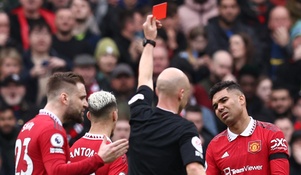Americans should consider watching European soccer?!

Abstract
Soccer is the game of the world. With games being live at reasonable times and before the return of American sports (the soccer leagues returned around late May or June while the big four sports returned around late July), it became an incredibly viable option for many who wanted live sports and were clearly missing it. Soccer is a sport that has an interesting dynamic with the American public for many reasons, including the fact that it 1) isn’t American and 2) Americans aren’t good at it. All the good players and leagues are in Europe and they are fun to watch, even without fans. The difficulty is following them, not in time, but in loyalty to a fan base (most people just pick a team and act like they are big supporters, something you don’t generally see from people when they make their life choices). There is also another underlying problem that soccer possesses that ultimately creates a game that is a difficult reality for a fan or someone considering it.
Introduction
The Premier League concluded their season on Sunday, July, 26th as part of their project restart. After having to shut down for a few months with Covid-19 canceling all live sports, it was incredible to be able to watch live sports even though the games were in Europe and the games were still in front of no fans. The league saw Liverpool finally win the Premier League title after years of disappointment and coming short. The restart was fun to watch and the games were exciting despite zero fans in attendance (it became more convincing to watch the games as they were on at reasonable hours and the big sports in America had yet to resume).
After watching the Premier League, as well as other leagues across the globe I have come to a sad conclusion. Soccer sucks. Don’t get me wrong, the games are exciting, the sport is fun to watch and even more fun to bet on. I also am impressed by the skill the players possess and it comes as a greater appreciation when I realize the professional play of the Premier League in contrast to other leagues in Europe (Serie A, Bundesliga) and the greater contrast to a league like the MLS*. At the end of the day, I am just having this resounding disappointment when it comes to soccer and specifically the leagues that are worth following.
I know I probably have this American ignorance and bias that would make many say that my opinion is invalid or that I don’t appreciate the art form of soccer. I also don’t have the same commitment to soccer as the rest of the world has, in most countries there is soccer and everything else, in America I can follow the big four sports, college sports, and other random sports that are always seen on SportsCenter. Keep in mind that I don’t hate the sport rather following the sport has become something that isn’t intriguing. To understand why I’ve broken down why I don’t like soccer into three primary reasons.
Recruiting/Poaching
Great players are integral to success in any sport. Without great players, you can’t win, period. When it comes to professional soccer all the talented players are pretty much on a few clubs. The resources that the top clubs have to scout and develop players which already makes the playing field uneven in favor of clubs like Real Madrid, Barcelona, Liverpool, Manchester City, etc. The players that are incredibly young but are proven to be the next Ronaldo or Messi are snatched up most of the time by the top clubs before anyone else can get their hands on them. As someone who is a big fan of collegiate sports, I see similar recruiting rhetoric that creates an unfair game.
Think about it, a young player like 16 or 17 has a scout come to his family's house and promises a great future and finishes off the offer by throwing cash at the player and family to guarantee the player signs (am I talking about professional soccer or college football? Because college players don’t get bribed, right?). All the leagues have an uncanny similarity in that they don’t have a draft, the players generally come through recruiting and the teams with more money to throw will by default be more successful. The skill of managing players and a roster feels diminished and allows for top teams to be careless because they know they can afford to make mistakes, a Chelsea squad can afford to have both Mo Salah and Kevin De Bryune on their bench in 2015 because they don’t have to worry about losing the stars.
The top clubs can also simply poach the best players from the middle tier teams. The examples of this are endless and it just leaves an unbiased fan like me feeling the plight of the middle tiered club. I look at a team like Borussia Dortmund and almost pity the fact that they were the ones who defied the odds and landed some of the best young talents in the game before any of the elite clubs could spot them. They had Robert Lewandowski, Christian Pulisic, and recently Jadon Sancho all before they hit their primes in their careers, only to lose them as they transferred to the top clubs for ridiculous amounts of money.
Dortmund isn’t the exception, this plight applies to most if not all but a handful of clubs. RB Leipzig lost rising star Timo Werner to Chelsea, Southampton losing one of the best center backs in Virgil Van Dijk who left to Liverpool and became a crucial piece in the championship defense, it just becomes more and more common to see middle-tier and even good teams forced to recruit in an uphill battle knowing they are likely to see their star players walk away in a few short years.
As an unbiased fan who doesn't have a team, it’s already deflating knowing that even when clubs do well in recruiting and find those gems that no one saw, they only will be snatched up by a powerhouse and the club returns to square one.
Competition
This has similar ties to the above mentioned. Any sport needs competition, competition is what makes us watch sports, the unscripted season that is about to be endured and nobody knows who will win it all. The problem with the European soccer leagues is that there is no competition.
Bayern Munich has won the last seven Bundesliga titles, Paris Saint-Germain (PSG) have won the previous three French Championships and 7 or the previous 8, Juventus has won the previous nine Serie A Championships and while Barcelona and Real Madrid have shared the top of La Liga of the past decade the message is clear across the leagues of soccer. The top teams haven’t just won the competition or dominated the competition, they own it.
The Premier League can be regarded as the league with the most parity with numerous winners over the previous decade but even the Premier League has a diluted competition. Leicester City won the title in 2015-16 and it shocked the world but other than that, if you don’t support Manchester United, Manchester City, Chelsea, Arsenal, Liverpool or Tottenham, you have no chance of seeing your club win the Premier League and even reach the top four, qualifying your club for the Champions League.
Every year, all 20 teams start the season with optimism that this will be the year and they will win the title when in reality only six or even fewer teams have a real chance of winning the title. That’s again deflating, even in the league that has shown the most parity, we see the same clubs competing every year for the title. These top clubs have the best players, coaches, managers, assets, facilities, budget, and anything else that makes them superior and thus better clubs. Even if a club makes a bad signing or a bad hire, they can afford to simply get rid of them where other clubs can’t just eat a contract.
There are many reasons for the gap in competition or shall we say owning the competition in the Premier League and the rest of the top leagues in soccer. The lack of a salary cap can be linked to one of the top reasons as a team like Manchester City or Chelsea can have a bad signing or even three since they are outspending the rest of league by ten folds and for every bad signing, inevitably comes three good ones (not by skill but by sheer default). Now Major League Baseball doesn’t have a salary cap and even though this leaves mid and low market teams at a disadvantage, the teams still have a legitimate chance to win the World Series Championship**. This can be pinned on the style of the game of baseball and rightfully so since evaluating talent in baseball is harder to do than evaluating soccer talent. With all this being said, one of the forgotten reasons why a sport like Baseball sees more parity is the relegation factor or lack thereof.
All the top soccer leagues have relegation where the worst teams in the top league get relegated while the best teams in the second-best league get promoted. While relegation promotes competitive play for the entire season and denounces the idea of tanking, it inevitably creates a monopoly at the top. Many clubs are stuck in limbo between the top tier and the second-best tier, in the meantime, the top teams can stay at the top with as they are above and beyond the fear of relegation. Relegation ultimately created tiers of clubs and with that, we lost the competition. The idea of a draft would be regarded as absurd but a draft is what keeps sports in America competitive, the system in Europe has reduced most of the clubs to farm systems of the best, a good coach or player is only in the middle tiers to develop into a star and that’s if the club is lucky since the top clubs will snatch the best usually before anyone can.
Ultimately, the best clubs own the competition as they own the resources to do so. I don’t know if the leagues want to ruin the formula that they already have since fan bases for the top clubs are bigger than they ever have been. Rivalry matches between two top clubs are watched more than ever. The Champions League is one of the most-watched competitions in the world as it brings the teams that basically own their leagues into an elite group and have them play each other in a season-long marathon to determine the best team in Europe***.
Once again, the idea that anyone can win or that there is competition is just not the reality, for someone who doesn’t have a club to support and doesn’t feel the fan commitment that many around the world do to their clubs, the reality just taints the leagues. Even the Premier League is a six-team race and recently we have seen some of those top clubs lose a step and have to make some big signings or transfers to return to the top. Most people regard choosing a top team as being a front-runner, in Europe it seems like the only alternative if you want to see championships.
The World Cup
The World Cup is seen as the biggest, most celebrated sporting event. It brings the best players in the world together for a five-week competition with exciting games, highlight-reel goals and saves and goosebump moments. For as much praise as the World Cup gets, it is one of the most overhyped, over anticipated events in sports.
The World Cup for starters is every four years. Like the Olympics and presidential elections, there is one month of action that is surrounded by three years and eleven months of hype. Also similar to the Olympics, the World Cup destroys cities or countries and sets back their economy and infrastructure for years to come. Simply put, a country that hosts the World Cup in all economic and existential ways possible would be better off without it. Hosting gives instant pride but eternal damnation, a deal with the devil.
This isn’t about the comparison to the circus known as the Olympics or the circus known as the presidential election, this is about why the World Cup like the rest of the leagues is non-competitive. Like the European leagues, the World Cup historically has been dominated by four or five countries. If you don’t support France, Brazil, Germany or Italy you basically don’t have a chance of seeing your country win a World Cup. Granted Spain won in 2010 and that felt like a breath of fresh air, also Croatia had a magical run in 2018 where they were able to reach the World Cup Final but even they lost in the final 4-2 and it was clear that the French squad was superior.
The World Cup when it is boiled down, has a few Cinderella countries that are lucky to be there (Egypt, Sweden), a few countries that are good but not there yet (USA, Iceland, Mexico) and a handful of countries that have all the talent. The World Cup does produce the occasional upset but at the end of the day, like the club form of soccer, there are only a few teams that are competing for the ultimate trophy. Like the European leagues, the World Cup leaves all the countries hopeful that they can win the World Cup and to have that number reduced to 32 but in reality only see five or six countries have a real chance at winning the World Cup. This dominance frankly has more to do with the development of star players, countries that love the sport can and will produce numerous top players.
A country like the United States, where soccer is the fifth most liked sport and only garners the public's interest every four years (assuming they actually qualify for the World Cup) may produce a star player once in a while but won’t be able to compete for the World Cup.
I don’t know if there are ways to break up the monopolies in soccer. I also don’t know if the leagues want to break up the powerhouse clubs. I probably will still watch a game here or there but for someone who might be considering following a sport that is lopsided and already has a predetermined winner, I’d say try watching College Football.
* For those that aren’t aware, the MLS combines the washed-up players that were good in Europe and the American players that would never be good enough for Europe. One who is a fan of the MLS is like that one friend you have that gets hammered after one beer or one shot.
** And these teams actually won. The past decade and saw 7 different teams win the World Series. The 1980s saw nine teams win in ten years. The past decade saw two of the largest payrolls (the New York Yankees and Los Angeles Dodgers) not win the World Series.
*** The Champions League became non-competitive at one point. Real Madrid for three years in a row also owned the competition and when they finally disbanded (Ronaldo left) nobody could confidently say who was going to win.






